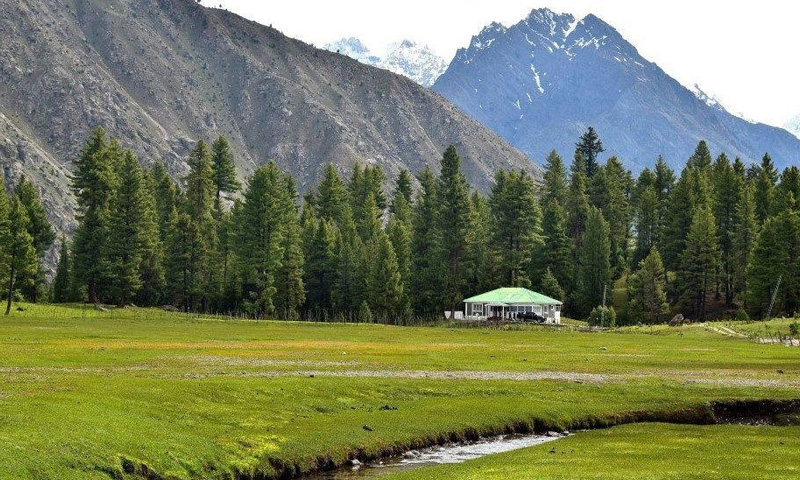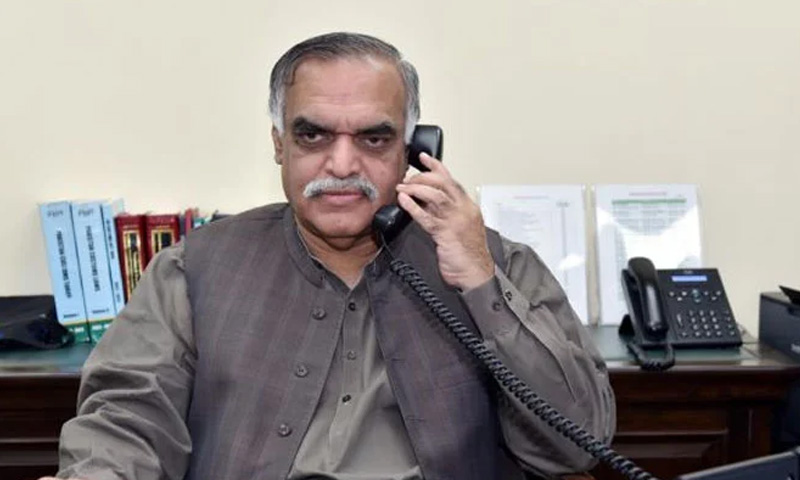- Web Desk
- 5 Hours ago
G-B govt insists leasing forest land, rest houses ‘win-win’ deal
-
- Tanveer Abbas Web Desk
- May 24, 2024

GILGIT: The Gilgit-Baltistan government on Thursday defended its decision to lease out guest houses and forest land to an army-owned private company, describing it as a “win-win deal” despite facing severe criticism from various stakeholders.
The G-B government has leased 37 properties, including rest houses and forest sites, to the army-owned private limited company, sparking strong opposition from lawmakers and major segments of society. In response, the government conducted an in-camera session for journalists to clarify the situation.
During a special briefing under the Special Investment Facilitation Council (SIFC), the provincial government denied all rumours circulating on social media. The briefing, held on the directive of Gilgit-Baltistan Chief Minister Haji Gulber Khan, was attended by Additional Chief Secretary Mushtaq Ahmed, Chief Minister’s Special Assistant Eman Shah, Chief Minister’s spokesperson Faizullah Faraq, Secretary of Construction and Communications Sabtain Ahmed, Secretary of Forests and Wildlife Zafar Waqar Taj, IT Secretary Azam Khan, Agriculture Secretary Mansoor Alam and others.
Answering the journalists’ queries, the officials explained that the decision was made within the government’s jurisdiction as a business model, which had been misrepresented on social media, causing public concern.
After the initial briefing, Special Assistant to the Chief Minister (SACM) Eman Shah and spokesperson Faraq opted to talk less, allowing the secretaries to detail the technical terms of the deal and share the five-year development plan. The majority of questions were answered by Additional Chief Secretary Mushtaq Ahmed.
When questioned about the absence of open bidding and the exclusive benefit to a single private company, Ahmed stated that previous experiences with local companies were “unfavourable”. He claimed that an open bid for leasing 13 properties prior to this deal attracted only one interested party, which was disqualified early on due to not meeting the prerequisites. He emphasized that at least Rs3 billion were required to upgrade the current guest houses, a capacity no local company in the tourism sector possessed.
He said that the leasing arrangement will enhance the region’s tourism infrastructure, promising a substantial upliftment in facilities, which they believe “will ultimately serve the interests of Gilgit-Baltistan and its residents.”
Ahmed also addressed concerns about leasing the properties at a throwaway rate, dismissing the allegation as “baseless propaganda and an attempt to misguide the general public.”
He explained that while the initial direct rent might appear less, it actually included direct rent plus a 55 per cent profit share – 35 per cent profit and 20 per cent for tourism development. Additionally, the monthly rent will be raised by 10 per cent annually, he said.
He claimed the numbers were much better than deals struck by other provinces as they had no rent share, making it a win-win deal for the region.
Regarding the accountability of the powerful company for any possible contract violations, Ahmed mentioned that a six-member joint committee would handle such issues by voting. If any issue remains undecidable in the committee, it will be referred to a two-member committee comprising the G-B chief secretary and a representative of Generals Headquarters (GHQ).
When journalists raised concerns about the strong opposition faced by the government in the assembly and the elected members of treasury benches shying away from the media and general public, Faraq responded, stating that as the government spokesperson and Eman Shah having the information portfolio, it was their duty to answer queries and face the media.
Addressing the question of non-representation of the region in SIFC, Eman Shah clarified that the Special Investment Facilitation Council is headed by the prime minister of Pakistan with the armed forces as facilitators.
Initially, Gilgit-Baltistan was not included in the council’s decisions, but the region’s inclusion was secured through local efforts, he claimed adding that within the next few weeks or months, Gilgit-Baltistan will have formal representation.
When asked about the potential benefits of selling carbon credits internationally instead of leasing forest sites, Forest Secretary Zafar Waqar Taj assured that the credits would not be affected. He stated that, according to the agreement, the company is bound to construct eco-friendly buildings instead of concrete structures.
Taj mentioned that they have five proposals for carbon credits, applicable only to recently grown trees and not old ones, noting that the process is lengthy and involves GIS mapping.
He said that they were currently working on selling carbon credits from trees planted during the Billion Tree Plantation campaign, which will be finalised soon.
Additional Chief Secretary Mushtaq Ahmed added that a UN representative was expected to visit the region soon to discuss the carbon credits.
Addressing concerns about departmental staff using forest department guest houses and the potential impact on their professional duties, Taj said that the company has assured the construction of new rooms specifically for the staff at no cost. However, no specific clause regarding this assurance is included in the agreement, as available with HUM News English.
When asked about the future of the currently employed staff of the rest houses, Mushtaq said they will be accommodated in various departments where they were required.
Addressing a question about deducing results from previous experiences to future deals being unfair, Mushtaq said, “The rest houses leased to Green Tourism constitute 40 per cent of the total guest houses.
“The remaining 60 per cent were still with us. The income generated from these 40 per cent guest houses was around Rs11 million annually, while the expenses exceeded Rs120 million, including a large number of employees who will now be rationalized and reassigned to other departments.”
He added that they will hold open bidding for the rest of the properties if required.
The officials also presented a five-year development plan, outlining the technical terms of the deal, aiming to reassure the public and stakeholders of the decision’s long-term benefits. They said they were working to raise revenue through public-private partnerships, leasing, and direct investments in various departments.




